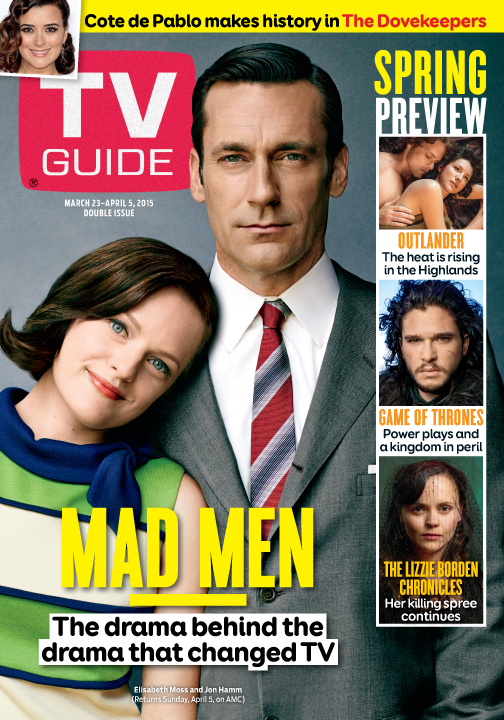Mad Men: The Drama Behind the Drama That Changed TV
 Cover photo of Elisabeth Moss and Jon Hamm by Jeff Lipsky for TV Guide Magazine
Cover photo of Elisabeth Moss and Jon Hamm by Jeff Lipsky for TV Guide Magazine
Check out our Mad Men covers here.
***
Matthew Weiner established himself as a sitcom writer in the late 1990s, toiling away on such shows as The Naked Truth and Becker. But on the side, he was working on a different kind of project: a drama set in the 1960s New York advertising world.
“I paid someone to do research for me,” Weiner recalls. “Then between the second and third season of Becker, I pulled the trigger and wrote it.” Weiner’s manager eventually got that early Mad Men script into the hands of The Sopranos creator David Chase, who immediately offered Weiner a job writing for the HBO drama.
Weiner’s tenure on The Sopranos gave him enough credibility to dust off Mad Men and pitch it again. In 2006, AMC—a struggling cable network looking for its first major series—bit. Seven seasons later, Mad Men has been widely hailed as one of the greatest dramas in television history, star Jon Hamm has become a household name, and AMC is a cable force. As the show returns April 5 for the final seven episodes, its stars, executives, and producers recount how the world went mad for Men.
Rob Sorcher (former executive vice president of programming and production, AMC): We didn’t have a signature series that people were talking about. There was a fear that AMC would be dropped from cable systems [if we didn’t get one].
Ed Carroll (chief operating officer, AMC Networks): We were not overly concerned about having a ratings hit at the time. What we were really looking for was distinction.
Sorcher: Matthew Weiner came in and gave this powerful pitch. The real question was, how were we going to do it? Our programming budget was so low. And it was a period piece, about advertising. Everything said: “Don’t green-light this show!”
Kevin Beggs (chairman and CEO, Lionsgate Television, which produces Mad Men): There were certainly questions from our international distribution guys about the viability of a period show that was so insular and so focused on one aspect of American business life. Plus, basic cable was not yet the hotbed of auteur-driven programming it has become. We just couldn’t make the numbers work. So AMC made the pilot on their own.
Weiner: That pilot cost just over $3 million—and it looked like three times that. We couldn’t afford to film outside. I had this idea that a very detailed interior would be just as exciting to the audience as re-creating Madison Avenue.
Sorcher: Matt asked Alan Taylor to direct while all his buddies on The Sopranos were on hiatus. They shot the pilot in 10 days in Queens.
Weiner: We were making a period show at the same time [the movies] Across the Universe and Revolutionary Road were filming in New York City. Just getting costumes for the extras was impossible. We were the least important ’60s project being shot in America.
Beggs: [With the pilot] I had something to show, and we finally negotiated an agreement to produce the series. Amazingly, Mad Men, which is so dialogue rich, was shot on a seven-day schedule. That’s incredible. Most broadcast shows start at eight days and inflate from there.
Sorcher: Our first-season budget was around $2 million an episode. There were moments where we weren’t sure we could deliver the show the pilot promised. Matt was very concerned. There were excellent financial reasons to get Lionsgate on board. They knew what they were doing.
Weiner: Everyone took advantage of the fact that basic cable had different rules, and we were able to hire a bunch of actors who were not yet household names. Big names weren’t interested in being in a show on AMC.
Vincent Kartheiser (Pete Campbell): Matthew Weiner was set on one guy [for adman Don Draper]: Jon Hamm.
Weiner: Writing the role, I was thinking about James Garner. He’s handsome, charming, and also really cynical. But at the time there was an antihero atmosphere in TV, and people like Jon were being cast mostly as villains. [AMC] suggested a couple of British actors, but I didn’t want to do that. Don Draper’s big secret is not that he’s British.
Hamm (Don Draper): It was the best pilot I’d ever read. The only other time I’d had that experience was when I read the West Wing pilot. But they cast Rob Lowe.
Weiner: I had this litmus test: At the end of the pilot when you find out Don Draper is married, are viewers going to hate this man? When I met Jon, it was like, “No, they’re not going to hate this guy.” There was some question about his sex appeal, which is now legendary.
Hamm: You’re not playing Superman. You’re not playing the embodiment of truth, justice, and the American way. So it’s not necessarily fun to be in Don’s head space. But it is challenging and attractive as an actor to get the opportunity to play that moral ambiguity.
John Slattery (Roger Sterling): I was called in to audition for Don. There’s a little disappointment when someone tells you they want you to read for Don Draper and you do all your homework [and] then they say, “We already have this guy, but we want you to play this other guy.” I met Jon shortly thereafter and I was like, “They do have that guy.”
Weiner: I didn’t approve of the trick, but whatever gets you there. I heard John wouldn’t come in otherwise. Then I had to talk him into being a part of the show.
Slattery: I was wary. And I don’t think I was fully invested while shooting the pilot—there wasn’t very much of Roger in that first episode. Matt did say, “I promise you, this will be a great part.” He was right about that.
Kartheiser: My agent would come to me with scripts and I’d go, “That sounds great. But what’s going on with that show I auditioned for months ago?” There was just something about the [Mad Men] script. It wasn’t about crime or like anything else on TV at the time. I was like, “My God, I want to go to a place where I get to say those words.”
Elisabeth Moss (Peggy Olson): I remember walking out of [reading for Weiner]. I called my manager and said, “I have to work with that man.”
Christina Hendricks (Joan Holloway/Harris): I originally got an audition call for Peggy. I told them, “This is a role for someone in their twenties.” Weeks later, I got the audition for [office manager] Joan. I was called back to read for the part of [illustrator] Midge, and then once more for Joan. It was that point in pilot season where as an actor you reach peak exhaustion and frustration. And at the time, there was no indication that any of the roles would turn into series regulars.
Weiner: Once Christina came in and read for Joan, she became a major character in my mind.
Hendricks: My agents dropped me right after I did the -pilot. They were like, “We warned you not to do this AMC pilot because we’re not going to make any money.”
Hamm: There was no star of the show. There was no person who was this big celebrity that we were circling. We were all hustling actors who wanted to do their best.
Robert Morse (Bert Cooper): They had already filmed the pilot and were back in Los Angeles [when I auditioned]. I walked in the door and there was a young man who was handling scripts. I was a little nervous and said, “Hi. I have this script here. I don’t quite understand what I’m reading. Can you understand this?” The young man said, “Oh, don’t worry about it. You go in, you’ll be fine.” I walked in and, my God, Matt Weiner was the boy. I was so embarrassed.
Weiner: He thought I was a production assistant! John Slattery had not committed to more than a season at that point, so I needed to create more of a world at the agency, just in case. Eccentricity is something you get when you hire Robert Morse. He said “goody” in the audition. And I put it in the script.
January Jones (Betty Draper/Francis): I went in to audition for Peggy, but Matt said, “There’s this other role.…” He was struggling with the network about Don’s domestic life. I don’t think they were as interested in finding out about who Don Draper was at home. Matt fought back on that.
Weiner: We had an unusual amount of secrecy from the very start. January Jones, for instance, was not part of the initial press launch because I did not want the audience to know that Don was married. I had this confidentiality threat on the cover of the script, which I borrowed from The Sopranos almost word for word. Everyone around me thought it was amusing. They were like, “You’re lucky if anybody cares about this show.”
Moss: I am now a disciple of Matt Weiner and his idea of keeping secrets. I hate spoilers. Matt would faint if he knew anyone on our show was live tweeting during an episode, because you’re supposed to watch the episode, not look at Twitter.
Charlie Collier (president, AMC): The lead-in to the Mad Men premiere was Goodfellas. We thought, take an iconic Scorsese film, filled with a lot of dark rooms and a bunch of men who think they are beyond the rules, and use it to launch our epic new series.
Sorcher: Not many people tuned in. There was some concern that first season, but that concern went away when the critics started writing about the show. It was the critics who ensured that this show got renewed.
Slattery: It took a while to make a dent in a popular way.
Carroll: You never green-light your first scripted series and expect to collect an Emmy for outstanding drama. It was a nice surprise. Then the show began to explode—you would see it in the style pages, references to Don Draper in the sports pages. It started popping up all over.
Season 1 ended with Don’s secretary, Peggy, giving birth to account man Pete Campbell’s baby, and Sterling Cooper partner Bert finding out Don’s shocking secret—his real name is Dick Whitman, and he stole a dead soldier’s identity. Season 2 was set a year later, in 1962.
Weiner: The skipping forward was a reaction to my fear that I did not have enough story. I felt that picking up the day after Peggy has the baby would just be too soapy.
Moss: The end of Season 2 when Peggy tells Pete about the baby and that she gave it away was one of the most beautifully written scenes I’ve ever been given.
Kartheiser: When it came to Peggy, I don’t know if it was ever about bedding her as much as it was something that gave Pete a sense of power that he lacked in his life. I think in some ways he hasn’t really graduated from that.
Season 2 featured many shockers, including Joan’s rape by fiancé Greg (Sam Page).
Hendricks: I was proud of how we did it. But I was surprised, and sometimes outraged, at the way that people phrased the conversation.
Weiner: The thing that was shocking to me was that there was a debate in the public about whether this was rape.
But Weiner says what generated even more controversy was the episode in which Don and Betty leave a pile of trash on the grass after a family picnic.
Weiner: I had to explain to the actors, because they are younger than me, that people used to just dump trash out and they would not look back. I had an overarching interest in the passage of time and showing certain things, like New York City becoming more dangerous and louder and more violent. Obviously the lawn-mower incident later in Season 3 [when a joyriding employee runs over the foot of an executive from the agency’s new British owner] is a dramatic moment that defined the show in many ways. We got the idea from stories we had heard about extremely dangerous, drunken behavior happening in these offices.
Slattery: Then there was the episode where I sang “My Old Kentucky Home” in blackface. I realize you can’t pick—you go where the character and the story go. But that was jarring. I remember the reaction of the first person who saw me step out of the van: It was an African-American motorcycle cop, with his mouth hanging open.
At the end of Season 3, Weiner dissolved Sterling Cooper to form a new agency. And, after years of Don’s philandering, the Drapers’ marriage was over.
Weiner: I was inspired by Weeds, where creator Jenji Kohan just burned down the entire town. It was a tough thing to get rid of the Sterling Cooper offices. I was superstitious about losing that set, and it was a huge financial commitment from Lionsgate to allow us to start over.
Jones: People wanted Don and Betty to get back -together. It was so unrealistic and dysfunctional, but fans loved their dynamic, as ugly and flawed as it was.
Morse: There were more women with their arms around [Don] than ever. I think we were the first Fifty Shades of Grey.
Weiner: I was not going to spend the rest of the series playing cat and mouse with that marriage. But when we started Season 4 and Don was divorced, I started having second thoughts, because I realized there was not a big tradition in American culture of telling a story about a divorced man. I came to the conclusion those kinds of stories weren’t written because the men didn’t stay divorced very long.
Jessica Paré (Megan Calvet/Draper): After the first time Don and [his new secretary] Megan kissed, one of the guys in the costume department said, “It was nice knowing you.” Then our propmaster came into my dressing room the week before we were shooting the second-to-last episode of Season 4, and she said, “I need to measure your ring finger.” I was so overcome.
Weiner: [Don’s proposal to Megan] was the act of a man trying to start over. The impulsiveness of it, that is pure Don Draper: “Let’s get married right now.” Don had an idealized version of that relationship, which really didn’t include anything Megan wanted. As soon as she expressed a desire to follow her own dream [of acting], it became a rejection of Don. Megan is the first contemporary woman on the show, in terms of her ambitions and how she asserts herself and what she thinks she’s entitled to.
Joan asserted herself by making the tough decision to sleep with a sleazy Jaguar executive in exchange for a partnership at the firm in Season 5.
Hendricks: That was based around many real stories that Matt had heard from women [in that era]. There were a lot of cheerleaders for Joan. I’d run into women in bathrooms and they would be like, “Girl, I would’ve done that.” And other people were upset.
In 2010, Weiner’s contract expired—and the tense negotiations played out in the press.
Weiner: There were conversations going on between AMC and Lionsgate that I didn’t know about. There were some demands being made about the running time, product placement, and the cast. I did not want to do it. There were all kinds of cost-cutting measures and control issues and I was like, “I thought we were in this together.”
Hamm: My thought was always that you’re not going to kill the golden goose. Everybody complains and then they eventually come to a deal.
Weiner: The great thing was being able to go back to work and pretend like it didn’t happen. There was so much more openness after that.
Over the years, viewers said goodbye to many characters, including Sal (Bryan Batt), a closeted gay man who was fired when he brushed off the advances of a client, and Lane (Jared Harris), a partner who hanged himself in the office after admitting to embezzling.
Weiner: There aren’t a lot of deaths on Mad Men. But if you get fired, you might as well be dead. There had to be stakes. Even when we had Peggy go to another agency, we did everything we could to convince the audience that Peggy was going to be a minor player at that point.
The first half of Season 7 concluded with the moon landing—and Bert’s death. Roger maneuvers a sale of the company, allowing for Don, who was put on leave after melting down during a Hershey’s pitch in Season 6, to resume his old position. Later, Don daydreams of Bert singing “The Best Things in Life Are Free,” giving Broadway vet Morse a chance to exit with a song and dance.
Morse: It was a lovely moment, I thought.
Weiner: In the end, they all got rich, but Bert is dead. And questions remain: Can Don and Peggy have a relationship again? Can Don and Roger have a relationship again? Can Don prove himself to new partner Cutler [Harry Hamlin]?
Hamm: When we first met Don, he was the master of his universe, although it was wobbly. We see him struggling with selling cigarettes. It’s a very quick realization that something is rotten. He’s living a double life, and that’s tricky. So, he’s set up to fail. It’s no accident that the credit sequence shows a man seemingly in charge of his environment and then the environment falls apart around him—and he falls. That has been the arc of the character for seven seasons—a fall. And so the hope is that he recovers or that the fall leads to something else, because nobody wants to see the splat.
Moss: For me, Peggy and Don will always be my favorite relationship on the show. I used to hear for so long, “Are they going to get together romantically or is it a father–daughter thing? Is it mentor–protégée? Are they enemies? Are they friends?” It’s all of those things.
Weiner: Eighty-five percent of our crew was there from the first season—despite all those hiatuses and unintended delays. This is a family. We’ve grown up together, and it was a place people came back to. It will always be home.
Beggs: We have pitched Matt a million different spinoff ideas, but we’re like the unsuccessful ad agency that never gets that account. He knows he’s got a masterpiece on his hands and probably isn’t interested in a derivative of it.
Weiner: I’m not interested. And I won’t budge on that. I love that this is it. If people are left wanting more, then you did your job right.
Mad Men returns Sunday, April 5, 10/9c, AMC.
- Spring Preview, featuring Outlander, Game of Thrones, Orphan Black, Marvel’s Daredevil, Penny Dreadful, and more
- Cote de Pablo returns to TV in The Dovekeepers, a miniseries about bravery, romance, and female solidarity at Masada
- Meet James Corden, the new host of The Late Late Show
- Plus: Bones, CSI: Cyber, Vikings, General Hospital, and more





